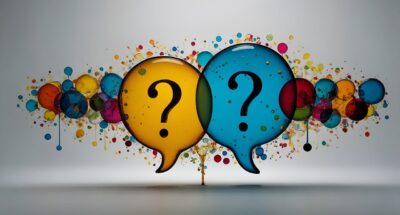
Asking Powerful Questions
Students cultivate a curious mindset by learning how to ask powerful questions. Through a hands-on activity, they practice crafting questions that foster deeper curiosity and more meaningful conversations.

Students cultivate a curious mindset by learning how to ask powerful questions. Through a hands-on activity, they practice crafting questions that foster deeper curiosity and more meaningful conversations.
Students OR Teachers OR School Staff will:
Deep curiosity, when channeled appropriately, can be a powerful tool for building meaningful relationships. Asking rich, “powerful” questions nurtures deep curiosity and helps us get to know others more intimately. By going beyond “weak” questions, we demonstrate respect for the other person, honoring their humanity and dignity. When we dig deeper, we show genuine interest and concern for the person in front of us, fostering a more meaningful connection.
However, it’s natural to draw a blank when thinking of relevant questions to ask in real-life situations, such as when you are with friends on a school trip or you’re sitting in the cafeteria eating lunch. So why not make a list of questions beforehand and keep it handy? That way, you can make the most of your curiosity-driven conversations!
But how do you know if a question is worth adding to your list? There are four things that distinguish weak questions from more powerful ones.
See the table below for examples of weak and powerful questions.
| Weak Questions | Powerful Questions |
| Are they not interested in being friends with you? (Closed-ended) | It seems like you are feeling unsure about the friendship. What makes you think they might not be interested in being friends? (Open-ended) |
| You have lost a lot of weight, haven’t you? You are looking really skinny—are you sure you’re okay? (Inauthentic/Predatory) | I noticed you haven’t been eating much at lunch this week. I just wanted to check in—how are you doing? (Authentic/Genuinely concerned) |
| Hi, stranger, are you happy in your life? How much money do you make? (Inappropriate) | What activities bring you joy? What are some things you find really fulfilling? (Appropriate) |
| How was your trip? (Cliché) | What did you do during your trip that gave you a new perspective? Did anything change your mind? (Original) |
Here are some additional examples of powerful questions:
Let’s create a list of powerful questions with a simple exercise:
Ask your students:
Next Steps:
Encourage students to practice deep curiosity by using their list of questions in real-life situations, as appropriate.
Ask students to:
This practice was adapted based on an exercise introduced in Seek: How Curiosity Can Transform Your Life And Change The World by Scott Shigeoka.
Curiosity is the driver of learning. It is closely linked to students’ academic performance. Specifically, curiosity is one of the strongest predictors of academic success in both math and reading for both children and teenagers. As teachers and learners, our language (including the questions we ask) can significantly influence our curiosity and attitudes about learning. Questions can be powerful tools to foster a sense of joyful exploration in a classroom. Studies also show that students’ curiosity is linked to their life satisfaction, positive emotions, hope, purpose in life, as well as self-compassion.
Curiosity serves as a motivational drive in almost all human activities, ranging from gathering information to solving the mysteries of the world around us. Students acquire new knowledge about language, relationships, and surroundings through their curiosity. Science thrives on curiosity. More importantly, curiosity plays a crucial role in fostering well-being and finding meaning in life, especially in highly uncertain and challenging times such as the COVID-19 pandemic and among young adults.
Curiosity promotes engagement, responsiveness, and flexibility to other’s diverse perspectives, thereby helping in building social bonds and positive relationships in school and beyond. Leading with deep curiosity allows us to challenge our assumptions and biases, which is especially important in the times of social isolation and loneliness. As a counter to rising societal polarization and social divides, curiosity can help us build bridges with those who we do not necessarily agree with.

Are you ready to build a kinder, happier school where everyone belongs? Join Greater Good Educators! Explore the science of well-being in a supportive community of educators from around the world. Registration is now open for the 2025-2026 school year!
Comments